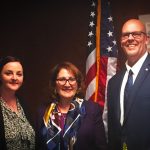The Association of Regional Center Agencies (ARCA) is an organization that represents the 21 Regional Centers across California. Their mission is to promote, support, and advance Regional Centers in providing community-based services to the over 400,000 people with an intellectual or developmental disabilities (I/DD) from birth to end of life served by the regional center system of care. As part of its mission, ARCA organizes an annual Grassroots Day where regional center representatives can meet with state senators and assembly members to discuss obstacles and issues pertaining to regional center services.
This year’s team met with several state senators and assembly members and was composed of Program Managers CJ Cook and Jennifer Cummings, Cultural Specialist Lilliana Garnica, IRC Client Advocate Stephen Donahue, IRC Client Advisory Committee (CAC) President Brandi Halstead, parent advocate Isabel Torres, Consumer Services Coordinator (CSC) Michelle Y. Harley, and the IRC Vendor Committee (VAC) Chair and Director of Government Relations at 24 Hour Home Care, April Stewart.
The Grassroots Day Lead Staff and IRC’s Legal Affairs Manager Jennifer Cummings said, “Grassroots Day usually takes place at the Capitol in Sacramento, CA. However, it was hosted again this year virtually out of caution. The virtual platform did not slow our team down from advocating for our families, and we were very excited to expand our team to include a parent advocate to help us advocate for positive change.”
Isabel Torres, mother of an IRC Client and parent advocate said, “As a mother of an IRC client, Grassroots Day gave me the opportunity to be the voice – not only of my son – but of other parents who seek a better life for their loved ones through the appropriate services provided by IRC; those services can be a huge difference in their opportunities to have a full and inclusive life. Grassroots day offered me the opportunity to meet legislators who have the power to make changes that will impact how people with disabilities live their lives.”
This group has first-hand knowledge of Regional Center barriers and client/family concerns. Among other things, Stephen Donahue, IRC’s Client Advocate, felt it was important to bring up the issue of transportation and how it impacts client involvement and independence.

Jennifer Cummings, Grassroots Day Lead Staff and IRC Legal Affairs Manager

Isabel Torres, Parent Advocate

Stephen Donahue, IRC Client Advocate

CJ Cook, Manager of IRC’s Community Engagement Unit
CJ Cook, Manager of the Community Engagement Unit at IRC, noted the importance of the day as, “Grassroots Day provides the 21 Regional Centers an opportunity to advocate the ongoing entitlement of individuals with an intellectual or developmental disability (I/DD). We are afforded the opportunity to meet with those who can have a direct impact on budget dollars. We also discuss the importance of the supports and services that enable full community inclusion of our clients. Over the past several years this has resulted in the restoration of social recreation, camp, minimum wage rate adjustments, and the removal of the respite cap.”
IRC’s Cultural Specialist, Lilliana Garnica, has been a critical member of the Grassroots Day team for several years. Lilliana said that “Grassroots Day is an important day for IRC Clients, as it is a day of advocacy and voice. With over 40k Clients that IRC serves and over 400k that the state’s service system is responsible for, unheard and unseen barriers are inevitable, but should not remain unconsidered. Grassroots Day provides the opportunity to meet with legislators who have the power to make changes, both positive and negative, which impact the Regional Center System of Care, its funding, and access to services. Clients and families rely on individuals, such as those with the privilege to participate in Grassroots Day, to be their voice for positive change to make supports attainable for all clients to live like people without disabilities.”
Michelle Y. Harley, a Consumer Service Coordinator (CSC) from the San Bernardino Adult Central Unit said, “I work with individuals aged 26-57 years old. This is my first year of participating in Grassroots Day. I was excited for the opportunity to advocate for funding to improve the quality of delivering necessary services to individuals and their families with developmental disabilities. Our clients greatly benefit from appropriate funding that improves the quality of their lives. ARCA Grassroots Day gave a voice and face to those we serve.”

Lilliana Garnica, IRC Cultural Specialist.

Michelle Y. Harley, CSC San Bernardino Adult Central

Brandi Halstead, IRC Client Advisory Community (CAC) President 2022/2023

April Stewart IRC VAC Chair and Director of Government Relations at 24 Hour Home Care
This year, the IRC CAC President Brandi Halstead attended and had this to say and the importance of advocacy, “ This day is important for the clients of IRC because it’s a way to advocate for ourselves and to help support those who can’t by advocating for all.”
For the second year, April Stewart, the Director of Government Relations at 24 Hour Home Care, joined the team and shared this about the importance of Grassroots Day. “As the current IRC Vendor Advisory Committee Chair (VAC) and Director of Government Relations at 24 Hour Home Care, I am excited for the opportunity to participate in ARCA’s 2022 Grassroots Day to advocate for improving our intellectual and developmental disability support system. ARCA’s Grassroots Day creates powerful advocacy by bringing together self-advocates, family-advocates, Regional Center staff, and service providers to form a united voice to push forward key system initiatives. These initiatives include better funding, breaking down barriers to service accessibility, and driving health equity. Last year, ARCA’s Grassroots Day played a key role in getting funding for Social Recreation reinstated and funding the service provider rate study. We hope to see more key wins for our support system this year to continue our mission to provide quality services and supports that empower people with intellectual and developmental disabilities to live meaningful lives as valued community members.
Advocacy – Key Points
- Modernizing Core Staffing Formula – ARCA and SEIU-California are jointly requesting $21.6M General Fund to reform the “Core Staffing Formula.” It is a budgeting tool that calculates most funding for regional center operations but has not been updated in many years. This is the reason caseload ratios increase over time. The biggest change being requested would tie the cost of service coordination to a similar state position. These updates would support all the key functions of regional centers – service coordination, intake, community services, and other key policy positions. When the number of people service coordinators are helping climbs too high, individuals served by regional centers and their families are not given the time and attention they need and have been promised. The goal is to reduce the number of people each service coordinator supports and let them better meet the needs of the individuals and families they serve.
- Repeal of Fees on Families – The Annual Family Program Fee and Family Cost Participation Program are two fees charged to families receiving regional center services. These fees – perhaps more accurately termed “disability taxes,” – impact Early Start families most. Getting young children services quickly is very important. The fees act as a barrier to needed services, and can create problems between service coordinators and families they are supporting.
- SB 882 (Eggman) – ARCA is co-sponsoring SB 882 (Eggman), which will create an advisory council to look at ways to improve interactions between law enforcement and people with developmental disabilities. SB 882 will also explore ways to improve peace officer trainings. This bill will have direct and positive impacts on the work of law enforcement, and the safety and well-being of people with developmental disabilities.
- AB 2378 (Irwin) – ARCA is also co-sponsoring AB 2378 (Irwin). Many people served by the regional centers want, and actively seek, employment. Despite ample research indicating such employees have lower turnover and lower on-the-job accident rates, employment rates remain low. By creating a tax credit for hiring a qualified individual, AB 2378 provides a meaningful incentive to hire a person with a developmental disability.
- Provider Rate Reform Acceleration – The Lanterman Coalition is a group of many of the leading statewide developmental services organizations in California, including ARCA. ARCA joins them in urging acceleration of planned rate increases from July 1, 2023, to July 1, 2022. This investment will improve the stability of the Direct Support Professional workforce and support staff recruitment necessary to achieve a return to greater in-person service delivery options.
Share this Post




